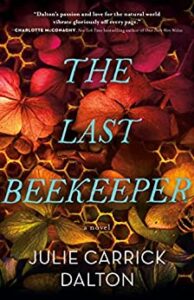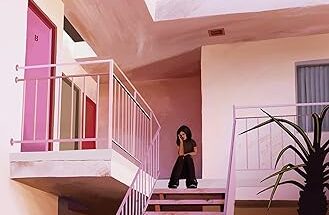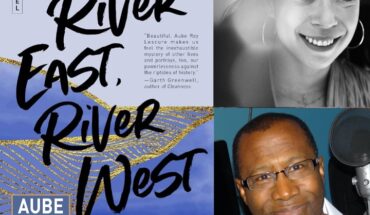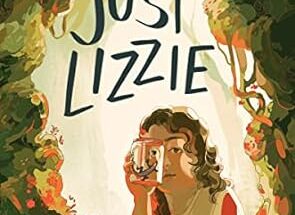 Julie Carrick Dalton’s The Last Beekeeper is a touching story about a very possible future–in a world without pollinators, amidst mass starvation and economic collapse, a young woman searches to understand her father’s role in society’s downfall, and her own responsibility for its continuation.
Julie Carrick Dalton’s The Last Beekeeper is a touching story about a very possible future–in a world without pollinators, amidst mass starvation and economic collapse, a young woman searches to understand her father’s role in society’s downfall, and her own responsibility for its continuation.
Christine: Much has been made of the “sophomore slump.” The Last Beekeeper is your second published novel. How was this process different from the first time you did it? Any unique challenges?
Julie: I sold my first two novels as a two-book deal, so when I drafted The Last Beekeeper, I was writing on deadline. When I first started drafting The Last Beekeeper, I had a moment (or twenty!) of panic. Did I really know how to write a book? What if that first book was a fluke? What if I let my publisher down? I went back to the basics. I read good novels. I revisited class notes from the Novel Incubator. I made a detailed outline and started from page one. It took a while, but eventually I found my groove again and fell deeply into the world of the new book. Now I’m working on book three and I find myself asking: Do I really know how to write a book? What if the first two books were flukes? So yeah, I haven’t mastered this yet.
What was the first spark of inspiration for this story? Has it been brewing in you for a long time, or was this a relatively recent idea?
Several years ago I lost two bee colonies due to toxic landscaping chemicals someone in my neighborhood was using. As I grieved for my bees, I couldn’t help but wonder how the native pollinators were doing. Were they being poisoned too? What would happen if all of our pollinators died? The story snowballed from there.
Much like your first novel Waiting for the Night Song, The Last Beekeeper strikes me as a novel focused on finding family and identity against a backdrop of climate devastation and institutional distrust. What is it about these themes that inspires you?
I never set out to write about those particular themes, but these are the concerns that keep me up at night. I think I use my novels as therapy to work out my climate anxieties.
Both of your novels rely on science to save the world, and the human heart to save the protagonist. How do you understand the correlation between emotion and ecology?
Oooh! I like this question. We are all part of nature. If nature is out of balance, then so are we. When a single organism becomes extinct, no matter how small, it alters the environment. It leaves hole that some other organism will fill. But that new organism can disrupt the habitat in ways we can’t imagine. This planet is spinning at 25,000 miles per hour. Things are shifting constantly. On a macro level, I worry out the future, our quality of life, the growing inequalities being exacerbated by climate change. It’s existential and scary. On a micro level, I worry about the health of the bees in my neighborhood. It’s personal and in front of my face. We can’t separate our physical or emotional wellbeing from the wellbeing of this planet.
Cli-Fi, or fiction influenced by climate change, is appearing with increasing frequency. The Last Beekeeper deals with elements of current climate change (the decrease of pollinators) and speculation of future climate impact (the death of all pollinators). What made you decide to add the speculative element?
The book was based on a ‘what if’ question. What if the pollinators died? I tried to extrapolate how it would affect agriculture, food security, the economy, politics, and geopolitical relationships. The scenarios I create in the book are entirely speculative, but they are informed by real science. Sadly, I don’t think it’s a far-fetched ‘what if’ question.
I recently saw a hilarious film review of the movie Alien on Twitter: Everyone dies because no one listens to the smart woman. Your novels have elements of no one listening to the smart woman as well. Is this Cassandra theme a commentary on gender, or a reference to contemporary distrust of scientific method?
I think it’s a little bit of both. I’m very distressed about society’s willingness to ignore science for ridiculous, self-serving reasons. We saw this on full display during the pandemic. I love the movie Don’t Look Up, which was a satire about how we choose to ignore the truth-tellers if their version of the truth is inconvenient. Let’s just say it didn’t end well.
“Allow yourself to fall in love with what is real, with what exists, with what might exist. And fight for it.” Faced with rapid climate change, and institutional powers not doing enough to address it (or, in some instances, even acknowledge it), how do you think readers will react to the overarching message of hope in your work?
I think a first step in mobilizing people to make meaningful change when it comes to climate crisis, is helping them fall in love with nature. Just look at how amazing a forest is! Or a grasshopper! Once you fall in love with something you are more willing to fight for it. I hope my books encourage readers to see how much beauty there is. Yes, be sad, be furious about what we are losing. But don’t get so mired down in anger and grief that you fail to see how much beauty still exists. Don’t lose hope. When we stop seeing it, we stop hoping. And if we give up on hope, we don’t have a reason to fight. My not-so-secret hope is that everyone who reads my book will fall in love with bees.
One of my favorite elements of this book is the creation of Apis Manifestation Syndrome (a clinically diagnosed condition causing people to hallucinate honey bees). Were there other fun darlings you came up with in your speculative world, that didn’t make it to the final draft?
Yes! I created an entirely new currency called the Liv, or the Livable. It was based on the concept of greenhouse workers being paid a “livable wage” for their work pollinating food. But it ended up exposing and exacerbating inequalities between the haves and haves-not. I really liked it, but it was so complicated and I spent way too much time explaining the economics and social structures created by the Liv. So, sadly, I cut it out completely. But trust me, it was awesome!
“Don’t blame the bees. Blame the machine.” Much of this story hinges on corrupt government practices around falsified information and unjust imprisonment. How did you balance global, institutional villains with a story that is, in many way, rooted in one, small family?
That was a real challenge for me. Who really is the villain in this story? It’s not black and white. All the characters have their own motivations, but none of them are completely evil. Collectively, however, the guilt sits on the shoulders of corporations profiting off of dangerous agricultural practices and the weak government officials who don’t stand up to them. But it’s a cop out if we wring our hands and blame corporations and governments. Individual need to take responsibility too. So I focused in on one family with lots of blame to share–and plenty of motivation to change. Because if they can do the right thing, maybe there’s hope for us all.
“It’s never just been about saving the bees…We’re trying to save ourselves.” End of the world narratives have always been popular. Some would argue that zombie narratives, dystopian narratives, and ecological disaster narratives all focus less on the end of the natural world, and more on the end of human dominion over the natural world. Do you feel your writing fits within this rubric?
The truth is, Earth is going to be just fine. It may take a while, but the planet will heal from the damage caused by humans. Humans, however, may not survive to see it. I’m not worried about the end of the world. I’m worried about the end of humans, or at least the end of our way of life. I don’t see The Last Beekeeper as an end-of-the-world story, although that fear is hovering over the book like a cloud. Maybe it’s more of a new beginning. I have faith in these characters that they are continuing to make important decisions after the end of the book. Maybe they will figure it all out and save us all.
You published your first novel after a long career in journalism, farming, and motherhood. Now you’ve got two books out and are working on (finished?) your third! Have you had a backlog of stories in your brain since childhood? Or was writing fiction a more recent interest?
I’ve been writing stories since I was a kid. My first credit was a script I wrote for my mother’s puppet theater when I was 10. I also wrote some spectacular fan fiction scripts for the TV shows Mork and Mindy, Wonder Woman, and Charlie’s Angels when I was in elementary school. I used to convince my friends to act them out in the woods behind my childhood home. I’ve moved on from fan fiction, but I have sooooo many stories ideas! I just signed a contract for two additional books with my publisher, Tor/Forge, Macmillan. And I have two more ideas simmering on the back burner.
Everyone loves a How I Got My Agent story! What’s yours?
I spent a long time getting feedback before querying agents. I didn’t want to query too early and lose my shot with my dream agents, so I spent a relentless year entering contests, participating in literary idol events, attending agent pitch sessions, and doing anything I could do to get industry feedback without actually querying. After a year, I won a critique from a well-known author. But instead of giving me feedback, she surprised me and said: “I can’t help you. You are ready to query this book!” I took a deep breath and jumped in. I submitted to a few agents at The Muse and the Marketplace conference and one of them happened to be Stacy Testa at Writers House. She read my pages and we met at the conference. She offered, I accepted, and I couldn’t be happier. It sounds like a short, boring story, but it’s because I spent so much time making sure I was ready to query. And it was worth the wait. I feel incredibly lucky to have a partner like Stacy in my corner.
Any advice for aspiring or new novelists?
Don’t rush.
Julie Carrick Dalton is the Boston-based author of The Last Beekeeper and Waiting for the Night Song, named a Most Anticipated 2021 novel by CNN, Newsweek, USA Today, Parade, and others, and an Amazon Editor’s pick for Best Books of the Month. A Bread Loaf, Tin House, and Grubstreet Novel Incubator alum, Julie is a frequent speaker on the topic of Fiction in the Climate Age at universities, conferences, libraries, and museums. Her writing has appeared in Chicago Review of Books, Orion, Newsweek, The Boston Globe, Electric Literature, Lit Hub, and other publications. When she isn’t writing, you can usually find Julie digging in her garden, skiing, kayaking, or walking her dogs. Follow her on Twitter @Juliecardalt




1 comment